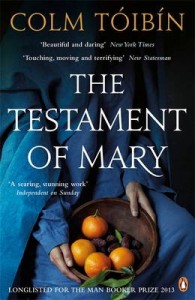Sunday 20th September 2013
A review of The Testamnet of Mary by Colm Toibin.
 When I finished The Testament of Mary I was angry. So angry, I had to wait a while before writing this review. The book reminds me a lot of Philip Pullman’s The Good Man Jesus and the Scoundrel Christ. Here we have gifted creative writers compelled by their ideology to write incredibly biased narratives that ignore the evidence of history.
When I finished The Testament of Mary I was angry. So angry, I had to wait a while before writing this review. The book reminds me a lot of Philip Pullman’s The Good Man Jesus and the Scoundrel Christ. Here we have gifted creative writers compelled by their ideology to write incredibly biased narratives that ignore the evidence of history.
Yet, I have to pause, because they are not attempting to write non-fiction. The moment I attempt to deny their right to write these stories, I become synonymous with book-burning Nazis. So instead I hope that readers will be disappointed that such a gifted writer as Toibin has ended up writing sub-standard material.
Certainly, the book has been less popular than he might have hoped. The author of Brooklyn (which I loved) has written a book that has moments of lyricism, but also moments when propaganda seems to clang the voice of Mary.
He has written of a Mary very distanced from the Catholic church of his home Ireland: not the Queen of Heaven, but a woman hidden away in the shadows of Ephesus by John and Paul who are rewriting the story of her son.
She is bitter and angry, trapped and in constant sorrow for her “misguided” son Jesus. Secretly she worships the Greek gods, an unusual choice for a Jew, let alone the Mother of Jesus. She does not believe that Jesus rose from the dead, and Toibin has her virtually kidnapped so that she cannot reveal the “lies” they are writing about Jesus as they build a new religion.
She retells the “true” story of what happened to Lazarus (he was never the same and should have been left dead), and other key Bible stories.
She is unable to read or write and yet somehow this story is relayed (it is unclear how), and she tells the “truth” because “enough has happened and because the chance might not come again.”
She claims that John and Paul “try to make connections, weave a pattern, a meaning into things.” She claims they lied and stole to escape the persecution that was to come. She also claims that “we… dreamed that my son came back to life”, suggesting that the resurrection was wishful thinking.
Toibin says that he was inspired by the great painting of Mary by Titian, and he read the translation of the Gospels by Greek scholar EV Rieu, and the books on the historical Jesus by Geza Vermes; but ultimately he allowed Mary’s voice to emerge. The stage monologue was produced as a commissioned piece before the novella.
Perhaps more disappointing than this portrayal of Mary, is the reinventing of Jesus as someone who started wearing fine clothes “unfamiliar, oddly formal and grand”; as one who gathered around himself “a group of misfits, who were only children like himself”; who was “grateful, good-mannered and intelligent.” The latter is dull praise for one who performed miracles, spoke words of truth, and ended up changing the world through his dying and rising.
Critics have claimed this book as a lesson in myth-making, as if Toibin’s recreation of Mary somehow casts suspicion on the original Gospels, or, more importantly, the person of Jesus. I hope discerning readers will see this book as sombre and distracting fiction, and see in the Gospels not just story, but history.
KARA MARTIN is the Associate Dean of the Marketplace Institute, Ridley Melbourne, has been a lecturer with School of Christian Studies, and Wesley Institute and is an avid reader and book group attendee. Kara does book reviews for Hope 103.2’s Open House and Eternity.
Email This Story
Why not send this to a friend?
